What do you get when a bunch of Austin Garden Bloggers get together?
- Beautiful plants to ogle
- Introductions to species you'd never seen or heard of
- Visits to nurseries and gardens you'd never been to
- Lots of chatting with new friends you have so much in common with
- Cameras. Need I say more?
- Celebrations of colors, textures, garden design, hardscape, art, and all things nature
- Stories of plants (identified by scientific name), trips, tours, kids, spouses, gardens, chicken coops, plant-swapping, buggy pests, and decaying dead urban wildlife at lunchtime (oops)
- Cars filled to the brim with newly-purchased plants
- Good times and good food and sometimes a little confusion
 Yesterday many Austin Garden Bloggers gathered for a day trip to Madrone Nursery in San Marcos, San Antonio Botanical Garden, and Antique Rose Emporium.
Yesterday many Austin Garden Bloggers gathered for a day trip to Madrone Nursery in San Marcos, San Antonio Botanical Garden, and Antique Rose Emporium.
Blogs represented were Digging, Sharing Nature's Garden, Go Away, I'm Gardening!, In Bloom, Great Stems, Shovel-Ready Garden, Garden of E, Rock Rose, Gardener of Good and Evil, Round Rock Morning Glories, Some Like it Hot, and Zanthan Gardens. We were quite the eager plant-loving caravan!
Our first stop was Madrone Nursery, owned by Dan Hosage, Jr. A native plant specialist, he was both enthusiastic and energetic in sharing his love of plants. Many of us bought plants, and I know I'll need to go back again soon with list in hand for others I'm interested in.
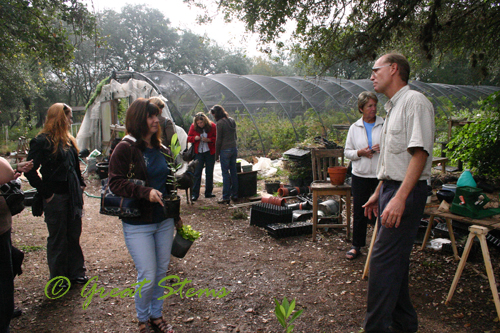 At the San Antonio Botanical Garden, we were greeted by towering century plant blooms.
At the San Antonio Botanical Garden, we were greeted by towering century plant blooms.
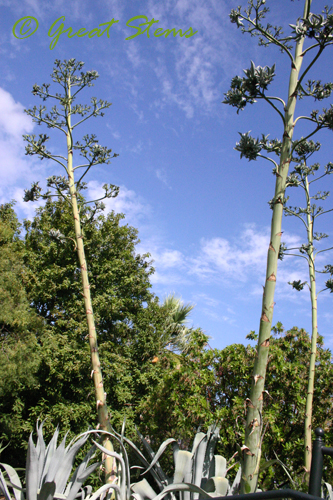 The lime-colored leaves of Duranta "Gold Mound" provided a colorful contrast to the surrounding plants.
The lime-colored leaves of Duranta "Gold Mound" provided a colorful contrast to the surrounding plants.
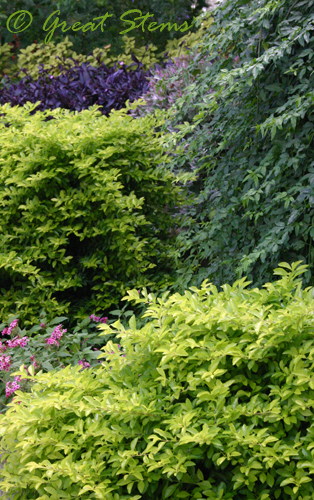
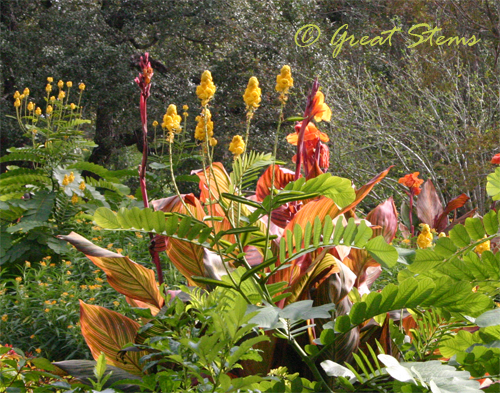
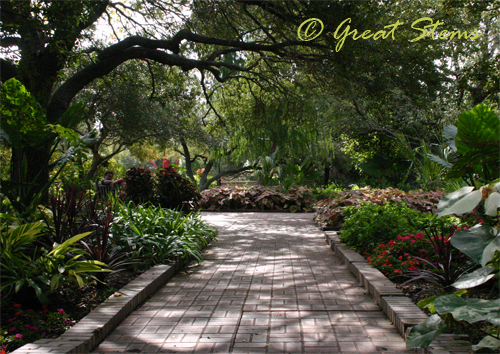
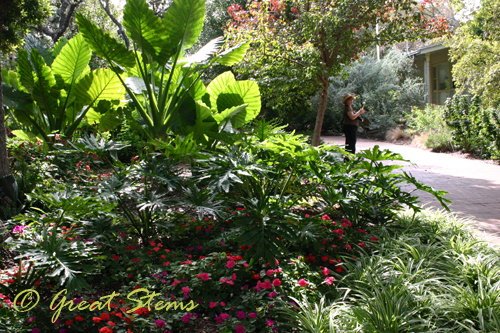 Note regarding many of these plant photos from SABot: I wrote down the names of as many plants as I could, and now I can't seem to find the sheet of paper I had. Perhaps I left it in Pam's car? If I can locate the paper, I'll update this blog with more plant IDs.
Note regarding many of these plant photos from SABot: I wrote down the names of as many plants as I could, and now I can't seem to find the sheet of paper I had. Perhaps I left it in Pam's car? If I can locate the paper, I'll update this blog with more plant IDs.
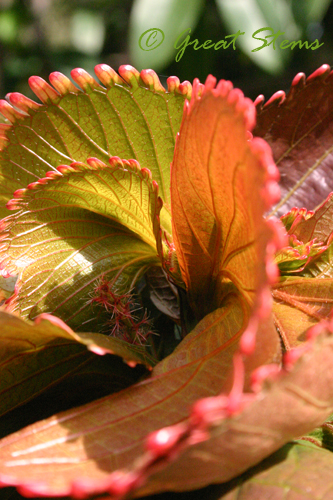 Bird of Paradise
Bird of Paradise
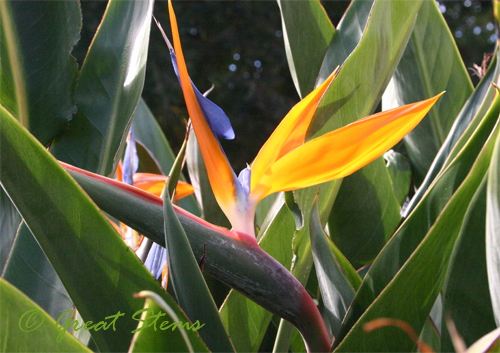 Bee in Datura
Bee in Datura
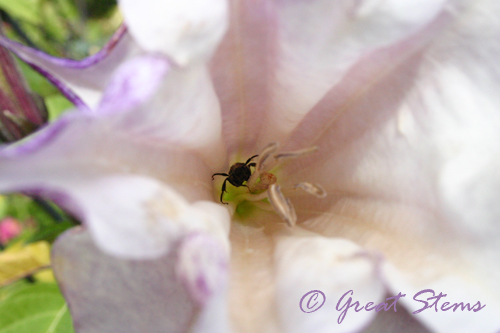
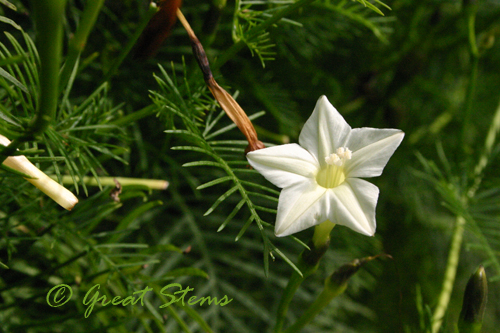 Black Beautyberry
Black Beautyberry
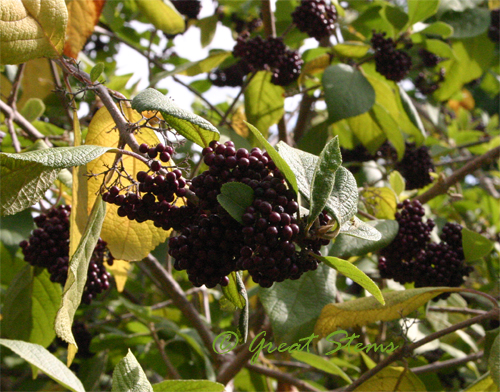
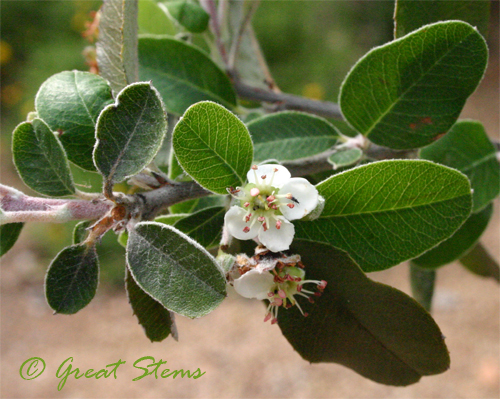
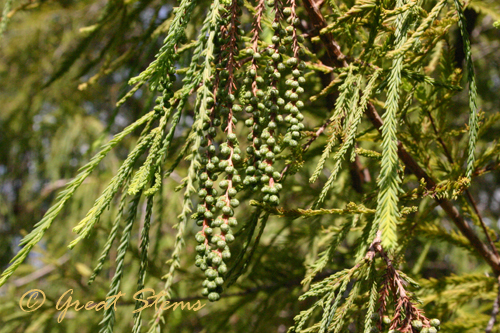
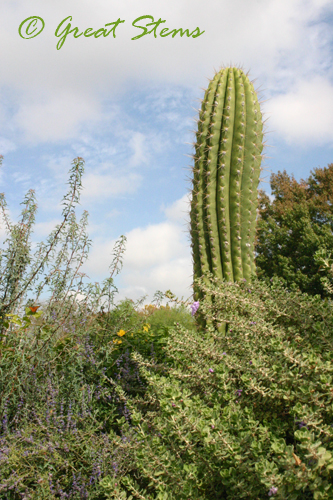 Barbados Cherry, loaded with fruit
Barbados Cherry, loaded with fruit
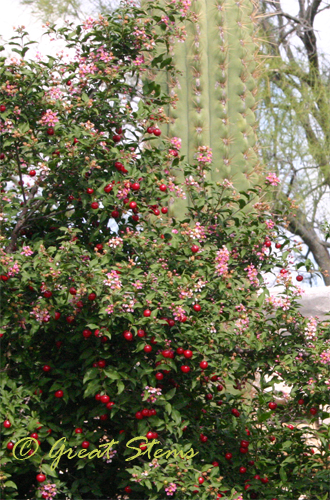 Pacific Chrysanthemums (the lovely white trim on these leaves inspired a few people to take this plant home from Antique Rose Emporium later in the day)
Pacific Chrysanthemums (the lovely white trim on these leaves inspired a few people to take this plant home from Antique Rose Emporium later in the day)
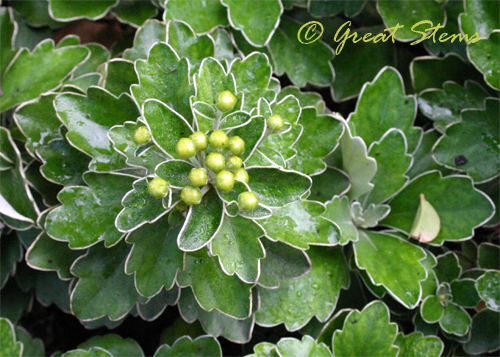 Papyrus
Papyrus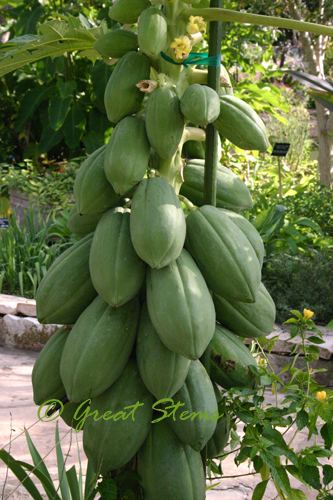
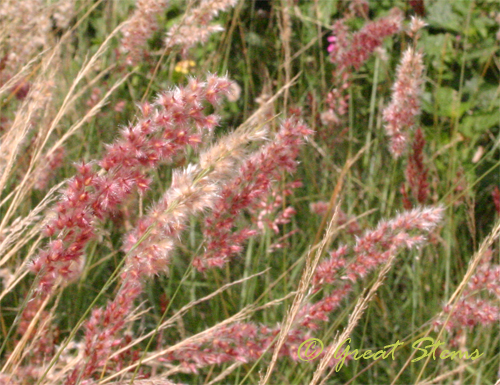 On display throughout the gardens were Dave Rogers' Big Bugs statues. Apparently these were at the Wildflower in Austin a year or two ago, but as I had never seen them before, I decided to run around to get pictures of all of them. They included a praying mantis, a dragonfly, a line of ants, an assassin bug, a ladybug, a grasshopper, a damselfly, and a giant spider on a web. Hmmm, it's hard to pick a favorite. It's hard to resist the spider, though. Guess that makes me a fly.
On display throughout the gardens were Dave Rogers' Big Bugs statues. Apparently these were at the Wildflower in Austin a year or two ago, but as I had never seen them before, I decided to run around to get pictures of all of them. They included a praying mantis, a dragonfly, a line of ants, an assassin bug, a ladybug, a grasshopper, a damselfly, and a giant spider on a web. Hmmm, it's hard to pick a favorite. It's hard to resist the spider, though. Guess that makes me a fly.
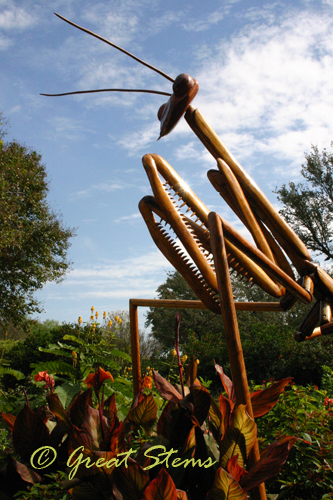
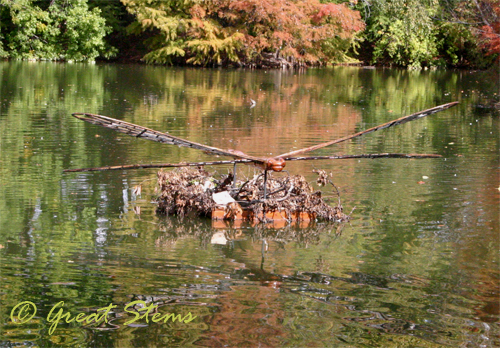
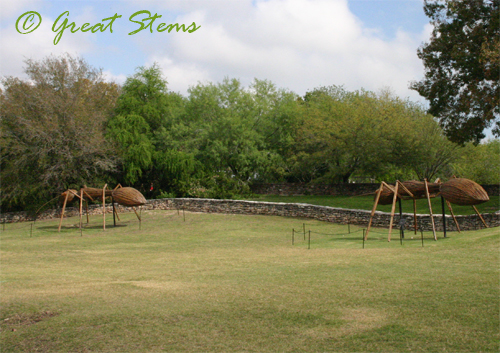
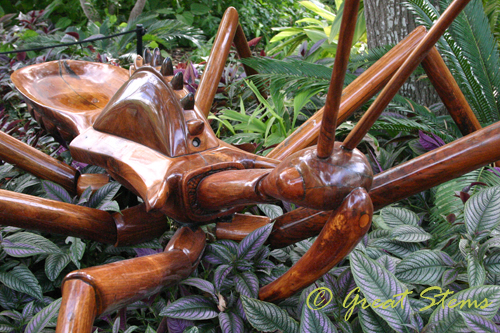
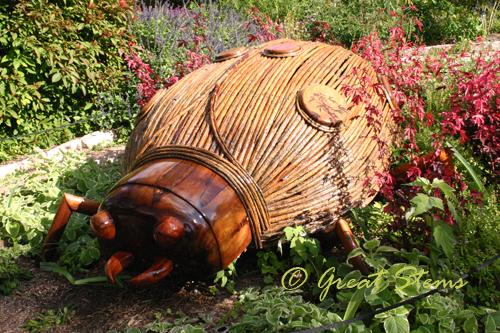
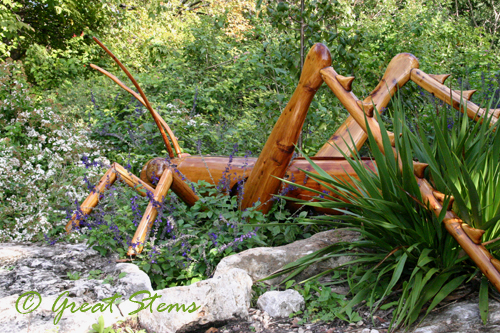
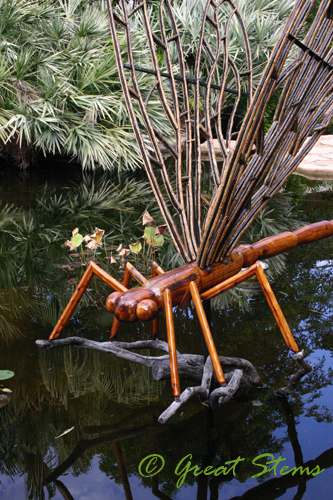
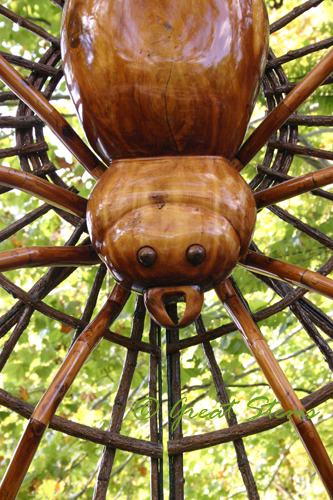
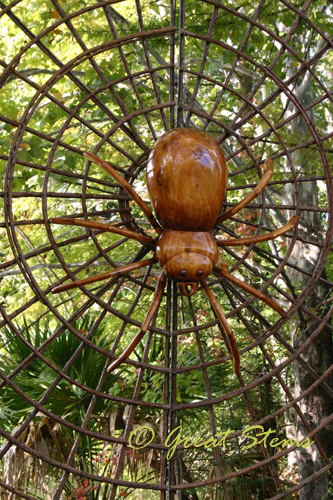 Of course, there was other beautiful art all over, as well. This statue represented different things to different people: a star, a child, a seastar, a Thumbkin, a dancer, and more.
Of course, there was other beautiful art all over, as well. This statue represented different things to different people: a star, a child, a seastar, a Thumbkin, a dancer, and more.
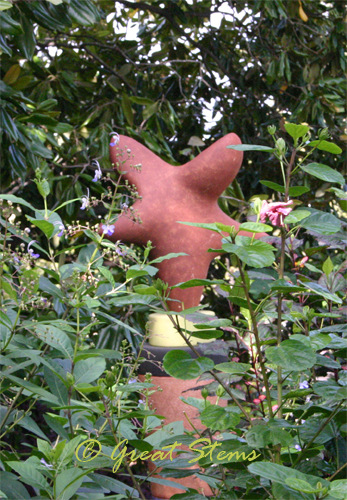 There were hundreds of Monarchs, especially around the pentas. I found it interesting that all the ones I studied were females. Where were the males?
There were hundreds of Monarchs, especially around the pentas. I found it interesting that all the ones I studied were females. Where were the males?
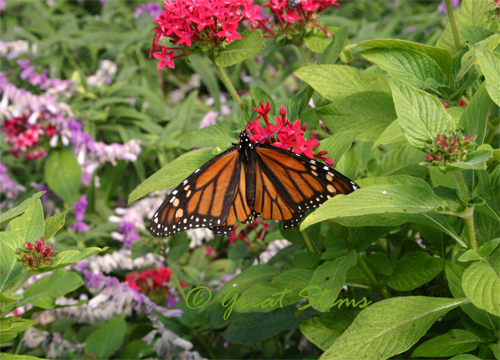 Oddly, the Monarch species dominated most of the gardens. Occasionally I'd see another species, like this Ceraunus Blue (Hemiargus ceraunus).
Oddly, the Monarch species dominated most of the gardens. Occasionally I'd see another species, like this Ceraunus Blue (Hemiargus ceraunus).
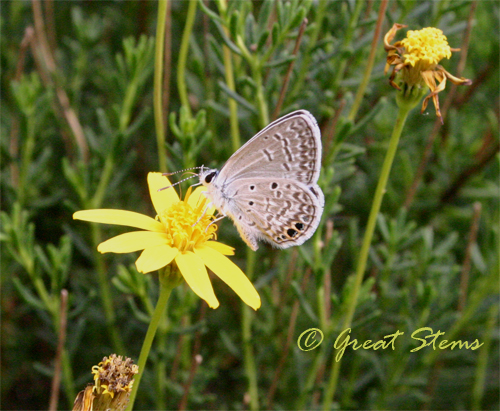 This Bordered Patch butterfly (Chlosyne lacinia), along with a companion, enjoyed a treat of Gregg's Mistflower nectar by the Auld House.
This Bordered Patch butterfly (Chlosyne lacinia), along with a companion, enjoyed a treat of Gregg's Mistflower nectar by the Auld House.
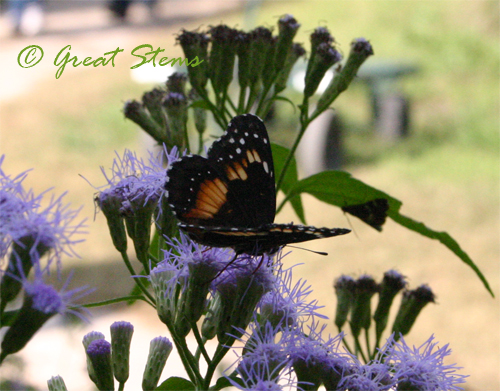 I fell in love with the Children's Vegetable Garden. These organic plots are maintained by children, and as you can see, they are quite productive. I couldn't help but admire the very creative scarecrows and other decorations throughout the mini-farm.
I fell in love with the Children's Vegetable Garden. These organic plots are maintained by children, and as you can see, they are quite productive. I couldn't help but admire the very creative scarecrows and other decorations throughout the mini-farm.
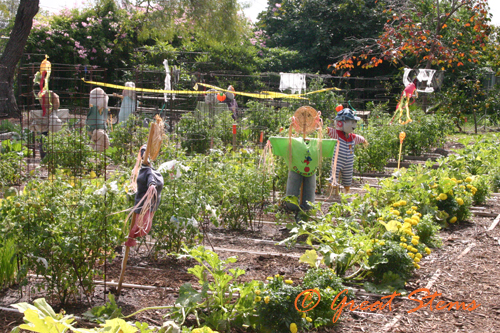
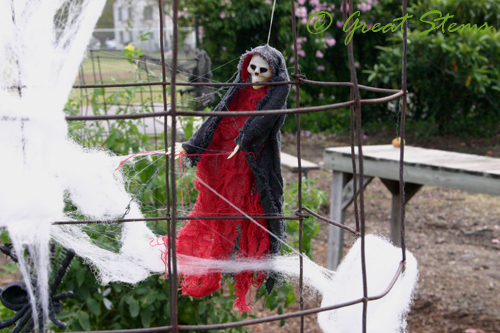
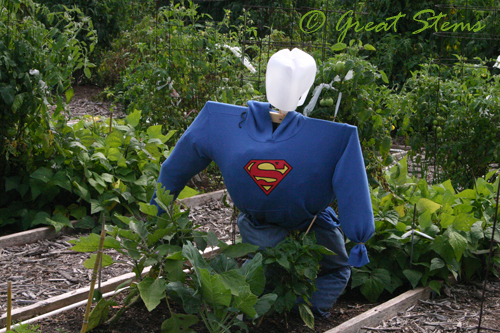
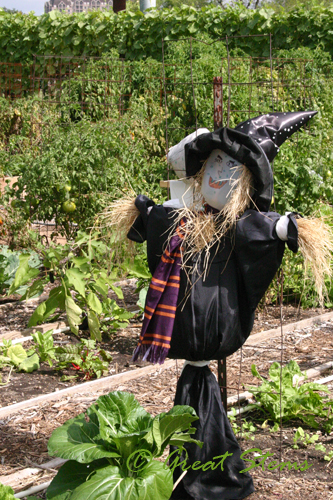
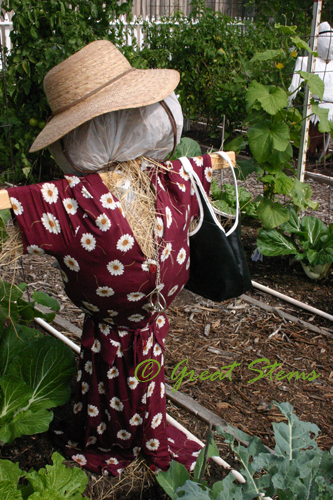 The Japanese Garden seemed a little sad because of its missing tranquil waters. The drought-caused water restrictions in San Antonio forced the shutting off of water features throughout the park.
The Japanese Garden seemed a little sad because of its missing tranquil waters. The drought-caused water restrictions in San Antonio forced the shutting off of water features throughout the park.
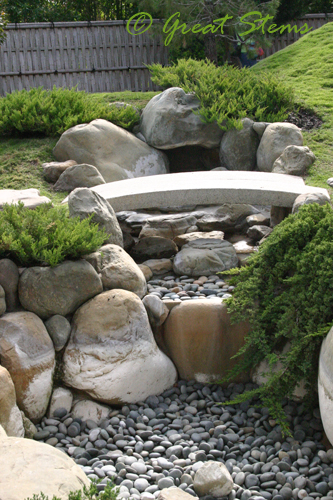 I was wowed by the simple design but elaborate effect of the fence surrounding the Japanese garden.
I was wowed by the simple design but elaborate effect of the fence surrounding the Japanese garden.
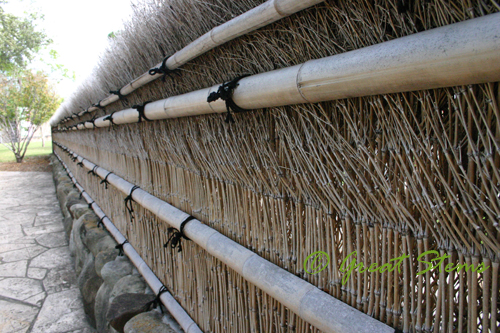 In addition to special exotic areas of SABot, the gardens also had areas focused on different Texas regions, such as South Texas, Hill Country, and this scenic lake setting representative of the East Texas Pineywoods. The reflections on the water were occasionally disturbed by a falling maple leaf or a duck creating a "V" while swimming across the still water.
In addition to special exotic areas of SABot, the gardens also had areas focused on different Texas regions, such as South Texas, Hill Country, and this scenic lake setting representative of the East Texas Pineywoods. The reflections on the water were occasionally disturbed by a falling maple leaf or a duck creating a "V" while swimming across the still water.
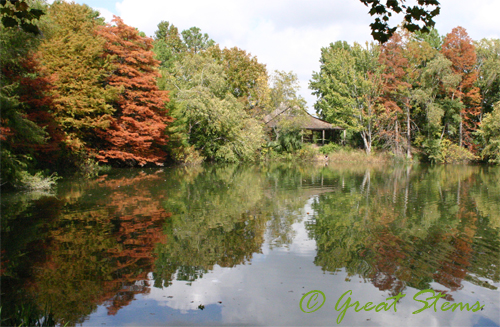
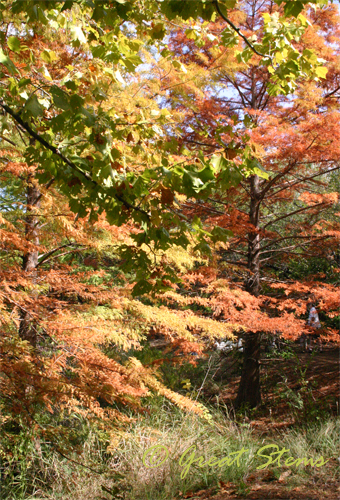 I am always fascinated by the protective spines found on cactus and various succulents.
I am always fascinated by the protective spines found on cactus and various succulents.
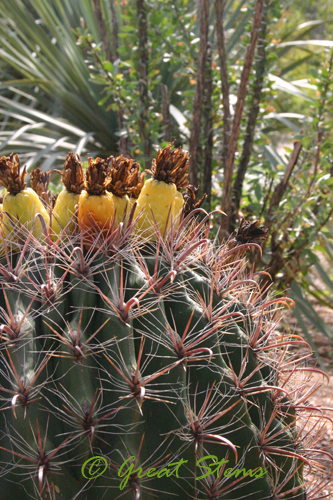
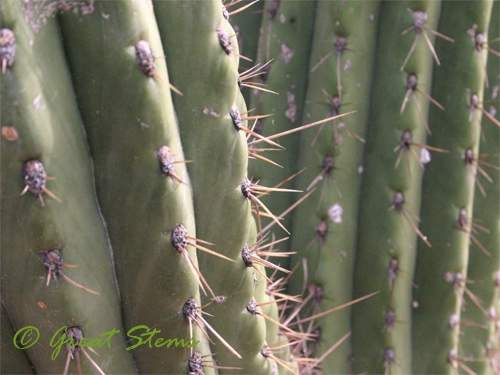 Ocotillo
Ocotillo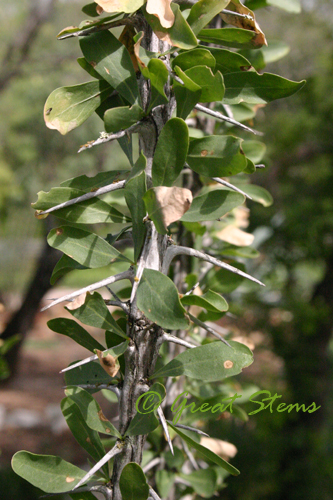
This Dr. Suess-like agave bloom is from a Butterfly Agave.
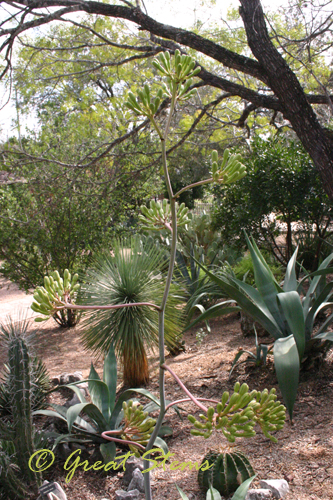
A close-up, and the plant is still delightful.
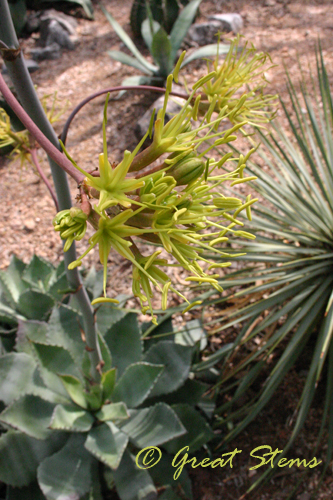 The Sensory Garden was an abundance of textures and scents. Here silver ponyfoot drapes off the sides of a raised garden.
The Sensory Garden was an abundance of textures and scents. Here silver ponyfoot drapes off the sides of a raised garden.
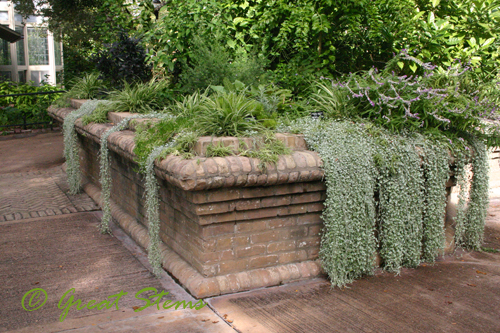 In the same garden, it might be tempting to touch this bumpy plant, but a closer look shows that each bump ends in a tiny and very painful spine. I wondered whether it really should be in a Sensory Garden, then realized that it was just barely kept out of eager hands' reach. I guess an attempt was made to correct the mistake, if it was one.
In the same garden, it might be tempting to touch this bumpy plant, but a closer look shows that each bump ends in a tiny and very painful spine. I wondered whether it really should be in a Sensory Garden, then realized that it was just barely kept out of eager hands' reach. I guess an attempt was made to correct the mistake, if it was one.
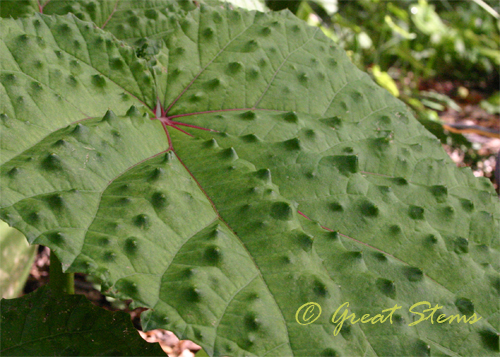 Off in the glass and cement pavilions of the conservancy, we were introduced to a vast collection of unusual plants from different growing regions across the world.
Off in the glass and cement pavilions of the conservancy, we were introduced to a vast collection of unusual plants from different growing regions across the world.
Karoo Cycad (Encephalartos lehmannii)
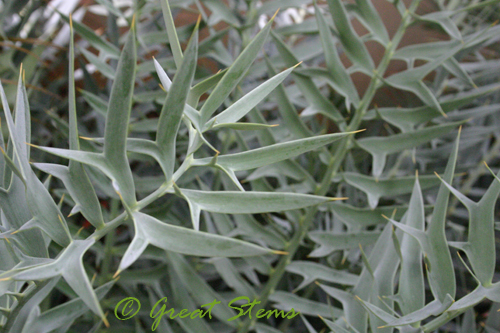
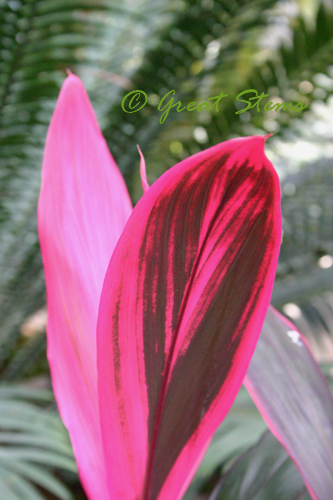 A photographer stops at nothing to get that perfect plant shot!
A photographer stops at nothing to get that perfect plant shot!
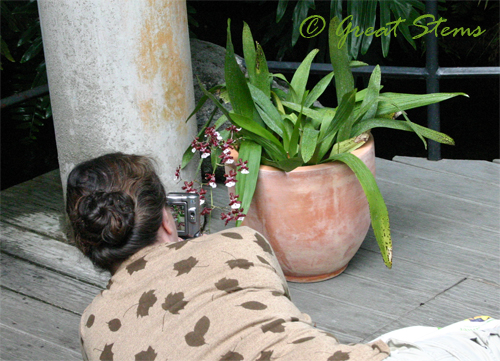
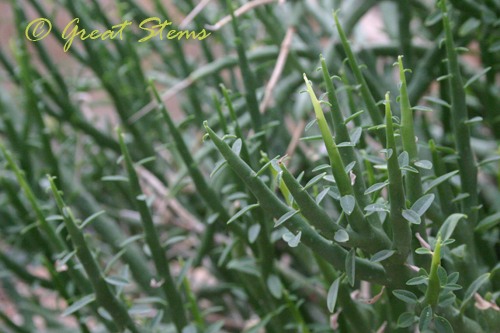
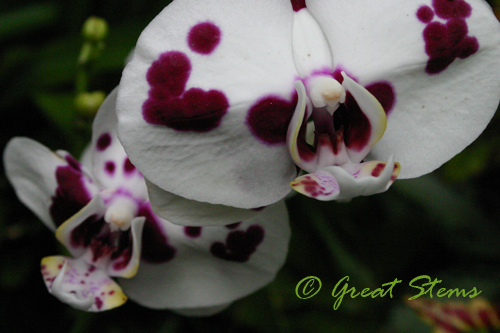 This Christmas plant looks similar to a Poinsettia, but it's actually a bloom on a large tree.
This Christmas plant looks similar to a Poinsettia, but it's actually a bloom on a large tree.
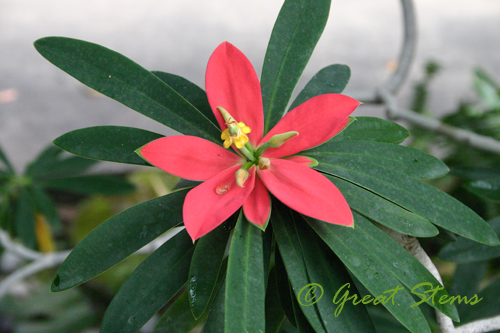
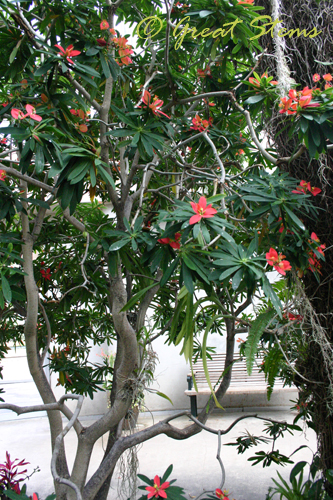
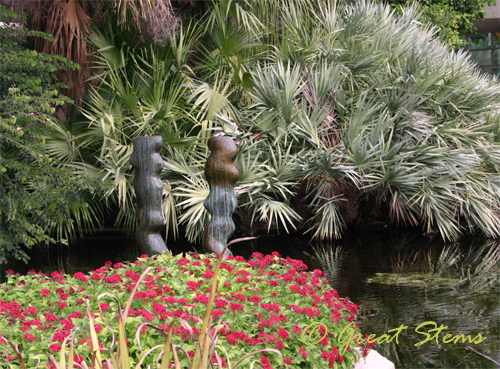 A big black bee visits a Lucky Nut, or Yellow Oleander.
A big black bee visits a Lucky Nut, or Yellow Oleander.
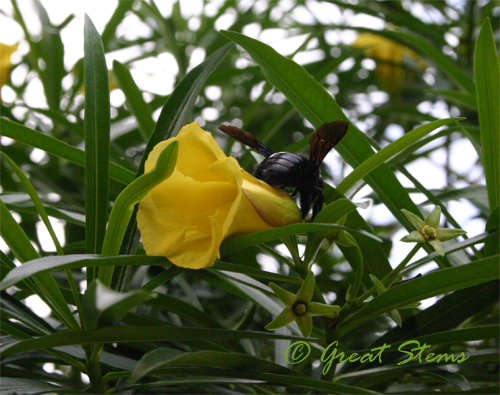 Life-Saver Plant (Huernia confusa) -- it's pretty obvious where this plant got its name!
Life-Saver Plant (Huernia confusa) -- it's pretty obvious where this plant got its name!
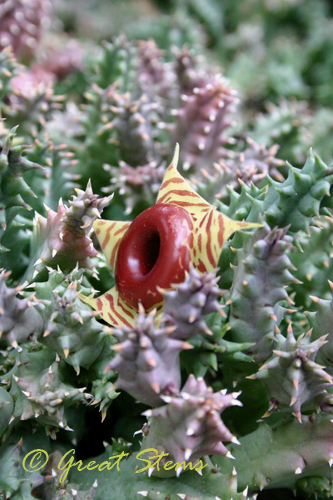 Many of the windows of the glass pavilions had been replaced with boards. It turns out that some of these had been damaged by deliberate gunshots from nearby Sam Houston. I'm quite appalled and upset about this. American soldiers and officers should be role models, not thugs.
Many of the windows of the glass pavilions had been replaced with boards. It turns out that some of these had been damaged by deliberate gunshots from nearby Sam Houston. I'm quite appalled and upset about this. American soldiers and officers should be role models, not thugs.
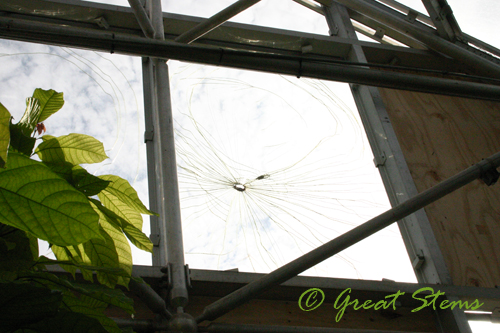 I had great interest in the Watersaver Lane, a series of houses showing a variety of approaches to yards. Tell me, would you choose the sparse, wildlife-unfriendly, and rather unimaginative traditional American yard? (The hint here is, "Please say no!")
I had great interest in the Watersaver Lane, a series of houses showing a variety of approaches to yards. Tell me, would you choose the sparse, wildlife-unfriendly, and rather unimaginative traditional American yard? (The hint here is, "Please say no!")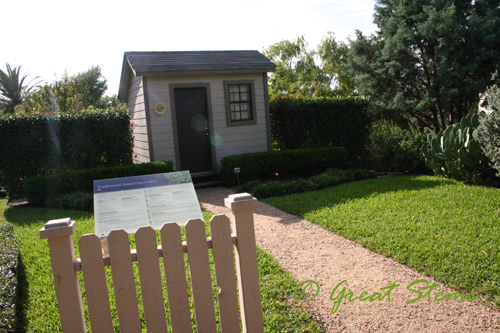 How about a Cottage-Garden style, with reduced lawn and colorful flower beds?
How about a Cottage-Garden style, with reduced lawn and colorful flower beds?
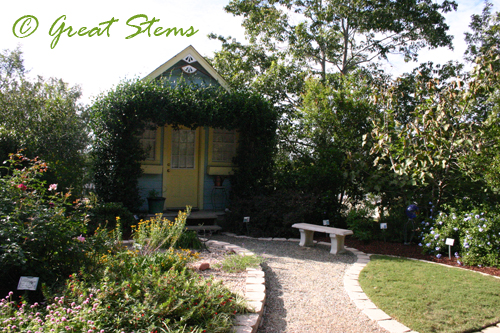 Or a Wildscape Landscape, complete with curvy paths, reduced lawn, and plants selected for their value to birds, butterflies, and other wildlife?
Or a Wildscape Landscape, complete with curvy paths, reduced lawn, and plants selected for their value to birds, butterflies, and other wildlife?
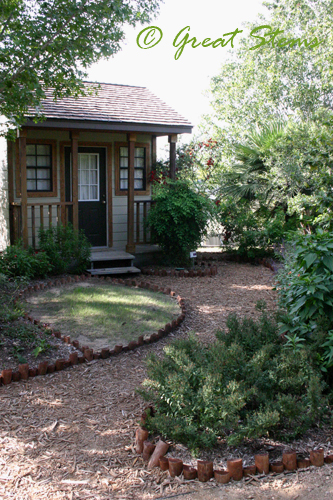 Or do you prefer the style of a Spanish courtyard?
Or do you prefer the style of a Spanish courtyard?
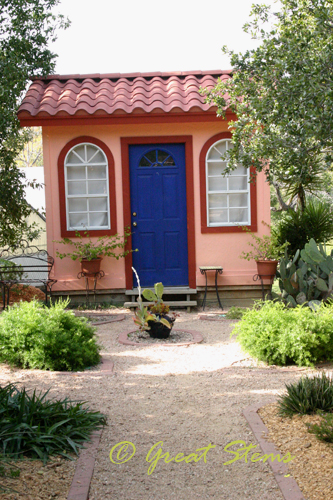
Two other styles were represented, a Manicured Xeriscape Lawn and a yard straight out of the Texas Hill Country. Certainly this look at yard styles and water-saving options gives one a lot to think about in terms of plant selection and design.
On the way back from San Antonio, we stopped at the Antique Rose Emporium near Selma. At first, I expected to be very much out of my element, as I don't know a thing about roses. However, it's hard not to take delight in the beauty and fragrance and variety of roses, and there were many native and Texas-adapted species as well, along with fun garden gifts.
This single white flower surrounded by pink buds was a bouquet all by itself.
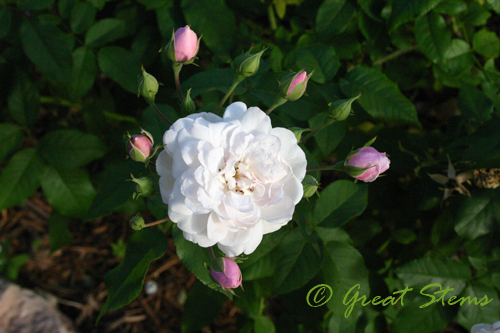 A white climbing rose in the "Mannerly Climbers" section drapes out of its pot.
A white climbing rose in the "Mannerly Climbers" section drapes out of its pot.
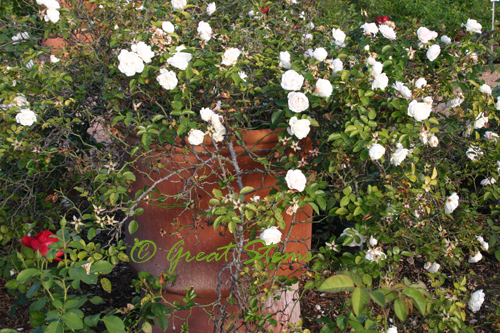 I was sorely tempted to go against my grain and choose a water-loving non-native Curly Willow to enjoy at home near my air-conditioner drain. But at the last moment, I resisted. I left with a native Passiflora and two kinds of wonderfully scented Pineapple Sage instead. If I ever have an appropriate bog, however, that Curly Willow might be mine for sheer fun!
I was sorely tempted to go against my grain and choose a water-loving non-native Curly Willow to enjoy at home near my air-conditioner drain. But at the last moment, I resisted. I left with a native Passiflora and two kinds of wonderfully scented Pineapple Sage instead. If I ever have an appropriate bog, however, that Curly Willow might be mine for sheer fun!
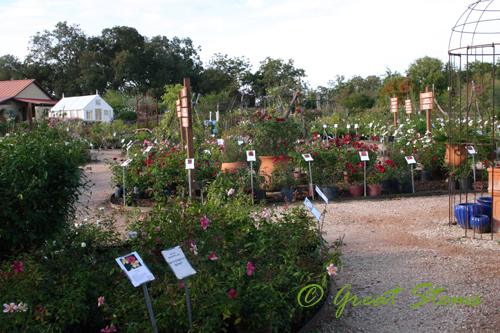 A good time had by all. Can you tell that this was the last picture taken of people restless from standing too long for photos? There were a lot of cameras "in line."
A good time had by all. Can you tell that this was the last picture taken of people restless from standing too long for photos? There were a lot of cameras "in line."
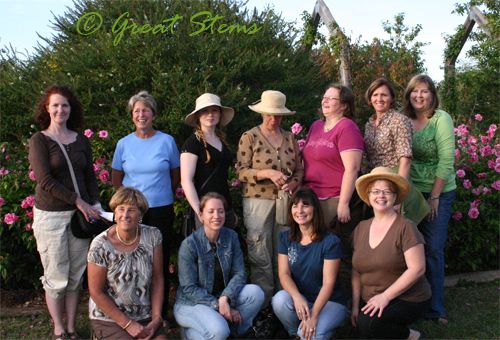 Time to go home. The cars that had room for plants were filled up completely, of course.
Time to go home. The cars that had room for plants were filled up completely, of course.
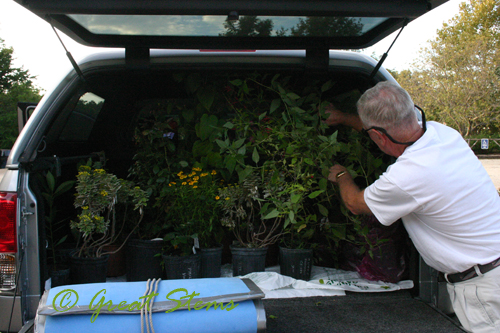
What a fulfilling, pleasant, happy day. Thanks, everyone!







